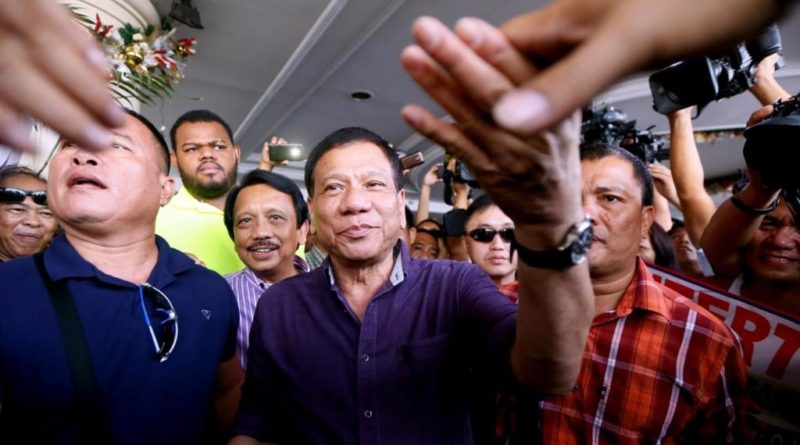TECH-MEDIA: MANILA – How Cambridge Analytica’s parent company helped ‘man of action’ Rodrigo Duterte win the 2016 Philippines election
MANILA – The parent company of Cambridge Analytica helped put Philippines’ leader Rodrigo Duterte into office after already influencing voters in dozens of campaigns across the globe, according to media reports and information pulled from the firm’s website.
Strategic Communications Laboratories, or SCL Group, which owns the political consultancy at the centre of a Facebook data harvesting scandal linked to the 2016 US presidential race, boasted on its website that it helped get Mr Duterte elected in 2016 by rebranding him as a tough crime fighter.
The company removed the website content about the 2016 Philippine election, however, archived versions are still visible on the internet. Though SCL did not identify its Philippine client by name, the brief pointed clearly to former Davao City mayor Duterte, who was one of the six candidates in the 2016 race.
“In the run up to national elections the incumbent client was widely perceived as both kind and honourable, qualities his campaign team thought were potentially election-winning,” the SCL web content said.
“But SCL’s research showed that many groups within the electorate were more likely to be swayed by qualities such as toughness and decisiveness. SCL used the cross-cutting issue of crime to rebrand the client as a strong, no-nonsense man of action, who would appeal to the true values of the voters.”
SCL still lists the Philippines as an area of operations, but no longer describes what it does there.
But a year before the 2016 Philippine election, a key SCL senior executive gave a rather revealing talk at the National Press Club (NPC) of the Philippines. He was Mr Alexander Nix, who last month was suspended as chief executive at SCL affiliate Cambridge Analytica, the firm accused of siphoning 50 million Facebook users’ data to aid Donald Trump’s US presidential campaign.
NPC president at the time Mr Joel Egco, now undersecretary of the Presidential Communications Operations Office (PCOO), covered Nix’s visit to Manila in May, 2015.
He told the South China Morning Post that at the time, he did not know SCL was operating in the Philippines, nor did he have any “inkling” that Mr Duterte would become a client of the firm.
“I was still a member of the press,” Mr Egco said, insisting he was not linked to Mr Duterte’s presidential bid at the time.
“I don’t even remember his [Nix’s] face any more … But what I remember is that I was taken aback when he said that mobile phone texting is going to affect the presidential elections.”
In Mr Egco’s story, published in the The Manila Times in May 2015 and titled “Text, emails to decide future polls – expert”, Mr Nix provides a rare glimpse into SCL’s clandestine activities in the Philippines and potentially dozens of other countries.
“Election campaigning will never be the same again due to the advent of cutting-edge technology,” the SCL executive at the time was quoted.
“The traditional and conventional methods that have been employed through all the elections in the last century may still work, but they will be unlike new strategies and tactics that are products of behavioural micro-targeting, psychographic profiling, predictive analytics and many other modern tools.”
Mr Nix boasted that SCL had seen a “100 per cent success rate” in more than 100 election campaigns in Asia, Africa, India and western Europe, and said the firm’s methods could get a “fundamentally flawed” candidate elected by maximising their “likeable traits”.
“Even if you have just one staggering likeable trait, given the right combination of strategies, you could win an election against a very formidable opponent.”
He also said in 2015 that SCL was “helping the Republican Party in the United States in regaining the White House from the Democrats”.
Although Mr Nix did not mention Facebook in the story, he did say the company was able to reach voters through social media and gadgets such as mobile phones and personal computers. And unlike traditional polling methods, Mr Nix said SCL used “psychographics” to change opinions.
“We need to make use of behavioural drivers which will ultimately influence the voter once he or she is in a polling place … Technology can be more effective in getting straightly to them and change their behaviour toward something.”
The SCL website also used to claim testimonials from former heads of state, including late Indonesian president Abdurrahman Wahid, whom it quoted as saying: “I am indebted to SCL for their strategic management of my election success.”
Likewise, former Thai prime minister Chuan Leekpai was quoted by SCL as saying: “Winning an election is about choosing your battles carefully. SCL made clear those conflicts that could be won, those that could not, and those that had to be hard fought for.”
Regarding its Thai operations, SCL explained that via “the world’s largest electoral campaign OpCentre” it was able to “determine Thai voter behaviour down to the constituency level”.
Mr Leekpai is now being eyed as a possible contender for prime minister.
SOUTH CHINA MORNING POST / Published05 APRIL, 2018 / UPDATED 05 APRIL, 2018 / / All photographs, news, editorials, opinions, information, data, others have been taken from the Internet ..aseanews.net | [email protected] | For comments, Email to : aseanews.net |









